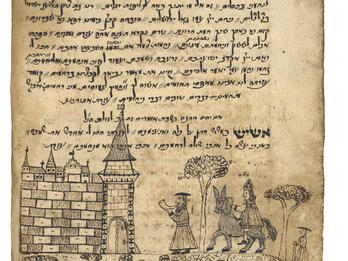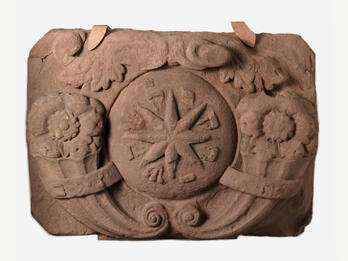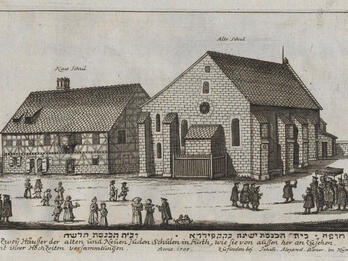Arbol de vidas, en el qual se contienen los dinim mas necessarios que deve observar todo Ysrael (Tree of Life, in Which Are Included Those Laws Most Necessary for All Israel to Observe)
Chapter 39
The will of the creator is that the world should be sustained, expanded, and populated daily by man, whom he shaped for his glory. That is, indeed, why he created this great machine, and therefore, one who performs the act from which all of this follows is doing the Lord’s will, which is the greatest good, by allowing this precept to be the highest of all and the root of its observance: since man cannot be eternal as an individual, he is eternal as a species, and the means for this is marriage, making eternal the human race to whom the law was given. Without that precept, this entire foundation collapses. Marriage is not some trifling thing to be pursued without solid foundations. If two separate bodies are to become one by order of the Lord, how could there not first be a firm Sign to prove that the act is holy and honorable, and this is the kiddushin or ring with which they are betrothed as the Lord ordained, so that this newly acquired woman will not seem the same as those acquired through sin, and it is right to make this distinction. It is also said that it is meant to be an assurance and a seal so that the woman knows her obligation to the man who has acquired and attained her as his sole female companion, and will remain faithful to him as the Lord commands. This might be why the ring is given, as a token which she wears constantly before her eyes, a reminder of peace, harmony, and unity, which is the glory and happiness of marriage. [ . . . ]
The words said when the kiddushin is given are: Hare at mekudeshet li be-taba‘at zot ke-dat Moshe ve-Yisra’el; which means “Surely you are betrothed to me with this ring, under the law of Moses and Israel.” Before the kiddushin is given, the kiddushin is customarily shown to some of those present so that they can see whether or not it is gold.
A groom who has relations with his bride for the first time, having seen blood and washed his hands, will say the blessing, which is in the books of blessings. From the night when the bride has relations with her husband, she will count four days, at the end of which she will check whether she is clean, and counting another seven days she will then go to the bath. If, for example, he has relations with his bride on a Wednesday night, then on the next Sunday, before sunset, she will check whether she is clean, and counting seven days, on a Sunday night she will go to the bath if nothing prevents this. For instance, if her monthly courses arrive in the middle of this time, then after the five days that a menstruating woman waits, she will check whether she is clean, and seven days later she will go to the bath [mikveh].
A married woman who notices that even one drop of blood has come out of her, even if it is as small as a mustard seed, is unclean and cannot lie with her husband or even touch him until she has been clean for seven days, and before she can begin counting those seven clean days she must wait five days. For example, if she finds herself to be treyfah [i.e., ritually impure and thus not permitted to her husband] on Saturday morning or afternoon, she will not wear washed clothes until Wednesday afternoon, before sunset, and the following Wednesday night she will go to the bath. But if she finds herself to be treyfah on a Saturday after Shabbat ends, she will not check whether she is clean until Thursday afternoon, and seven days later, the following Thursday, she will go to the bath. If after those five days she is still treyfah, she will check whether she is clean once she finds that this bleeding has stopped.
When a woman wants to check whether she is clean and can wear washed clothing, she must first wash herself so that no blood is left anywhere on her body, and during the seven clean days she is forbidden to eat from the same plate as her husband or for them to touch each other or hand each other anything directly from hand to hand. If she wishes to give something to her husband, what she will do is place it on a bench or on some other thing and he will pick it up from there. During this time, they cannot eat together at a table unless some object is between the husband’s and wife’s plates, such as a loaf of bread, a large basket, or a pitcher. However, if it is their custom to eat from the same plate when she is kosher, then it is sufficient, when she is treyfah, to each eat from a separate plate with no other difference. During this time, the husband also cannot drink what is left in a glass that his wife has been drinking from, unless someone else drinks from it between them, but the wife may drink what is left in a glass that her husband has been drinking from. The husband also cannot lie on his wife’s bed even when she is absent, or on any bed together with her. Additionally, on those days the woman cannot adorn herself as she would on days when she is kosher, and it is a good custom to have different dresses for the days of uncleanness. If the husband is sick and has no one to serve him, his wife may serve him but must refrain from washing his hands, face, or feet and from making his bed in his presence. If the wife is sick and no one else is available to serve her, the husband may touch his wife and serve her in this emergency.
If the husband is a physician, it is a sin for him to check her pulse unless there is no other physician.
If during the seven clean days she sees any [menstrual] blood, even on the seventh day, then she loses all those days and, by checking whether she is now clean, she will begin counting the seven days again.
When she checks whether she is clean, it must be during daylight hours before the congregation has begun the evening prayer. And then it is necessary to put washed sheets on the bed, examining them first to make sure there are no bloodstains on them.
A woman who finds herself to be treyfah during any of the seven clean days is allowed to check herself for cleanness again on that same day, even three or four times in one day, first making sure that she has cleaned herself.
A woman who miscounts the seven days and goes to the bath on the sixth, thinking it is the seventh, and who after lying with her husband remembers that it was the sixth day, is obligated to keep a distance from her husband as if she were treyfah, and starting on the night of that separation she must count four days, and on the afternoon of the fourth day she will check whether she is clean and the next night she will immerse herself again at the bath.
On the day when a woman is to go to the bath, she should not busy herself with anything that would stick to her hands, such as kneading dough and similar activities. She will clean her body very well and comb her hair to remove any encumbrances, cut her fingernails and toenails, removing any uncleanness between nail and flesh, and if she fails to cut a nail and immerses herself and there is any uncleanness between the nail and flesh, it will be necessary to cut it and immerse herself again. Before immersion, she must remove all bracelets, rings, and so on. But if it happens that she entered the water still wearing such an item that is so tight that the water could not entirely reach all parts of her body, she must remove the item and repeat the immersion. When she goes to enter the bath, she must take care not to put the soles of her feet in dirt or in anything that would stick to them, and also must clean her teeth, and it is a good custom not to eat meat on the day when she will go to the bath so that it will not stick in her teeth, and if after immersion she finds some meat or bone or other thing stuck to her body, she will repeat the immersion.
Before immersion, a woman who is to go to the bath must wash her entire body, and her head as well, with lye or hot water, so the hair is free of encumbrances, and must then wash it and comb it again in addition to the combing she did at home, and only then will she enter the bath.
A woman must immerse herself in the presence of a Jewish woman or girl at least thirteen years of age to ensure that she does so correctly, putting her entire body in the water at the same time with not even a hair out of it, because otherwise she must immerse herself again, and if no woman is available then her husband may be present, and if there is no one to accompany her she may tie her hair into a large knot so that none of her hair will float on top of the water. A woman must immerse herself only after nightfall, regardless of whether she goes on the night of the seventh day, which is the eighth since she found herself to be clean, or whether for some reason she goes after more than the seven clean days have passed, unless the bath is outside the City and the city gates close [at a certain hour] or if the bath is in a place where it is dangerous to walk at night. Entering the bath still in her smock, she must say the blessing, and in some places it is customary to say it after immersion while still in the water, placing the smock on top, and this is what is best. The blessing is: B, A, T, O, L, O, G, K1 of the world, who sanctified us with his commandments and commanded us regarding immersion, and if someone immersed herself and forgot to make the blessing she is still deemed to have had a proper immersion. While her husband is on earth, a woman has an obligation to immerse herself at her time and therefore may go to the bath shortly before the Sabbath or on the night when the Sabbath or a festival has ended, in which case she will wash herself thoroughly on Friday, on the Sabbath Eve, or the eve of that festival, and on the evening when the Sabbath or the festival has ended she will once again wash herself and comb out her hair a bit in hot water and will go to the bath, with the caveat that if unavoidable circumstances force a woman to go to the bath outside her time, she will not immerse herself on a Friday before the Sabbath or on a Saturday night.
Additionally, if a woman’s time for immersion falls on a Saturday after the Sabbath and that is the night of a festival, such that she cannot comb her hair on the Sabbath or that night, then it is sufficient for her to comb her hair on Friday. Likewise, if two [festival] days of Passover fall on Thursday and Friday and her time for immersion is on Friday as the Sabbath is beginning, she may wash herself and comb her hair on Wednesday, and if the two days are Sunday and Monday, and if Monday night is her time for immersion, she will comb her hair on Friday, taking care that on those days of Passover she gets nothing sticky on her hands that would prevent her immersion after the festival. If the night when she should immerse herself marks the start of the fast of Tisha be-Av or Yom Kippur, she cannot go on those nights, as she is prohibited from having relations with her husband then, and so she will wait until the night when those fasts have ended (though some hold the opinion that she cannot go to the bath on the night when Tisha be-Av ends) and then she may wash herself and comb her hair and go to the bath as usual. If she wants to avoid delays on those nights she can wash her body and comb her hair on the eve of those fasts and, as soon as they end, she may refresh her combed hair with hot water and, having washed her head, will immerse herself at the bath. During the seven days of avel [mourning], one cannot go to the bath but a woman may check whether she is clean with the understanding that her smock and the bedsheets must have already been used, and at the end of the seven days everything is lawful. On the day when a woman goes to the bath, it is good to do some act of charity, and before or after entering the bath she will say this blessing:
Lord of the world, God of Abraham, Isaac, and Jacob, may it be thy will that I should conceive by my husband tonight, on the night of this tevilah [immersion], and may the child I conceive be wise in thy law and fearful of thy holy name, observant of thy divine precepts. Hear, O Lord of the world, my request, and imbue me with a clean soul and give me thy grace to not be contaminated with children who are not good and virtuous. Deliver me from all evil thoughts, free me from the appetite for evil, make my heart steadfast and incline my imaginings towards good and keeping thy divine commandments, that I might be worthy for thou, Lord, to hear my prayer and grant my plea, because thou, O Lord, are the only God, who hears the prayers of thy creatures. May it be thy will, O Lord. Amen.
On leaving the bath, a woman will always try to cross paths with some good and virtuous person, for in the past there were women so virtuous that if, when leaving the bath, they encountered some unclean thing, they immersed themselves again. In addition, a woman going to the bath should try to go inconspicuously and not be recognized or seen by anyone along the way. [ . . . ]
One of a husband’s obligations to his wife is to avoid distressing her because, since women cry easily and the gates of their tears are always open, he may fear considerable punishment for that offense. He should also favor her with his words and be tolerant with her in light of her weak nature, learning from many sages of old.
Likewise, the wife’s obligations to her husband are to love, honor, and esteem her husband, to be tolerant, to overlook some flaws her husband may possess. The wife has an obligation to please her husband in any way possible: not being idle, being careful in running the household, and our sages say in the Gemara that even if a woman brings a sizable dowry from her father’s house and slaves to serve her, she is obligated to work and help her husband, for ultimately a virtuous woman is a crown to her husband, as King Solomon says, “A woman of virtue, a crown to her husband.”
Notes
[Initials of the phrase that begins many Jewish blessings: “Blessed art Thou, O Lord our God, King . . . ”—Trans.]
Credits
Published in: The Posen Library of Jewish Culture and Civilization, vol. 5.





